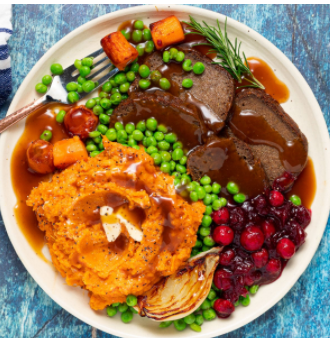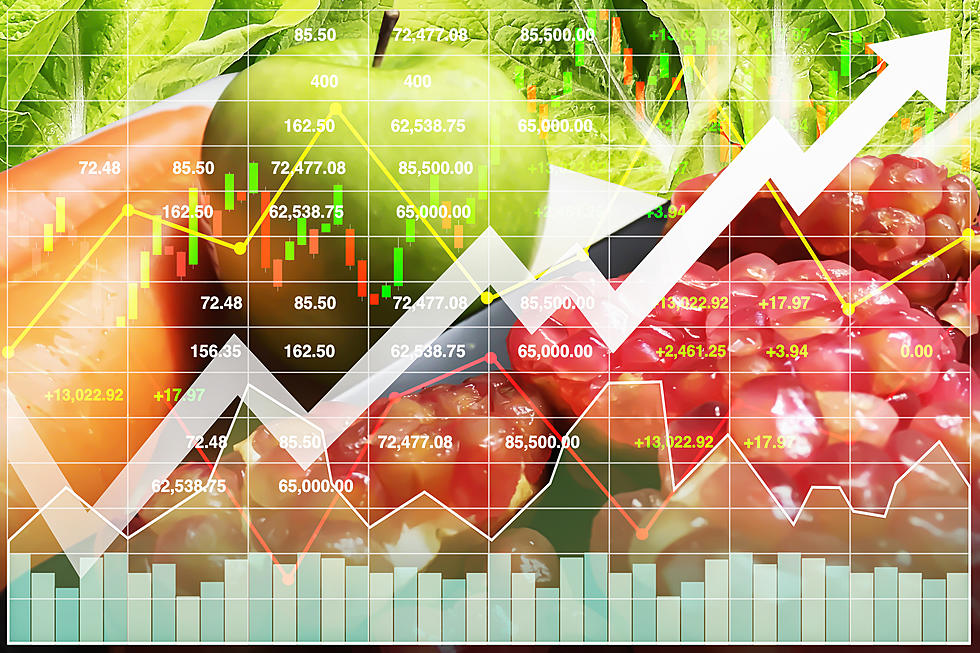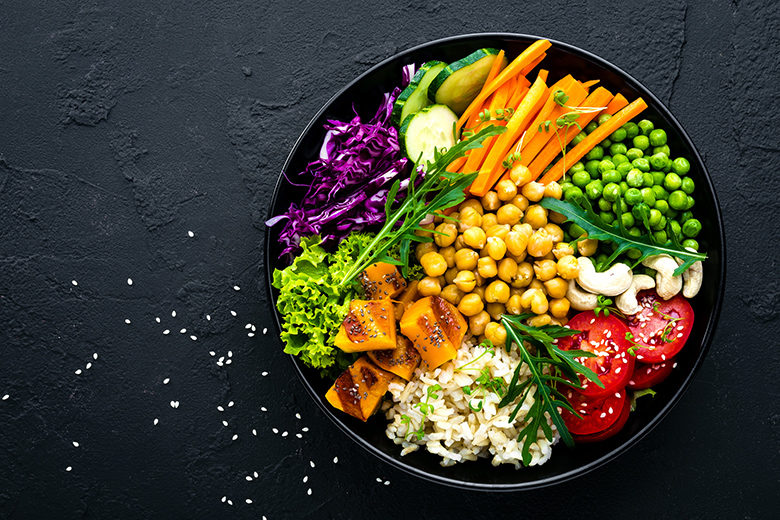
How To Get Protein On A Vegan Diet
Plants have protein too!
The main critique that individuals on a plant-based diet hear is “where do you get your protein?”.
My inner response is, “where do cows get their protein?”. The answer is, “from plants!”.
Did you know that all protein is originally made by plants? That’s right, all protein is created by plants! It’s not necessary to consume animal products to get adequate amounts of protein in your diet.
You see, only plants have the ability to take nitrogen from the air, break those molecules apart, and incorporate that nitrogen into amino acids and make protein. (This is explained in depth in the documentary What The Health, which we encourage you watch!)
So, when we consume animal protein, we are simply eating recycled plant protein. You could even call it ABC protein… Already Been Chewed.
Dr. Caldwell Esselstyn, physician, former Olympic champion, and author of The China Study, says “Grains are loaded with protein…. Beans are loaded with protein… Vegetables are loaded with protein.” Though some of these foods aren’t complete protein sources by themselves, eating a well-balanced plant-based diet does provide plenty of complete protein.
If you’ve seen The Game Changers, you know that many of the world’s best, strongest athletes are on a plant-based diet. Patrik Baboumian, Germany’s strongest man, said “Someone asked me, ‘How could you get as strong as an ox without eating any meat?’ to which he replied, ‘Have you ever seen an ox eat meat?’” In fact, the largest, strongest terrestrial animals on the planet are all herbivores. The myth idea that vegans are protein deficient is just that: a myth.
Several studies have shown that vegans have, on average, higher blood protein content than most meat-eaters out there. The main reason is that because we don’t consume animal protein, our liver does not have to fight the inflammation caused by it -- and therefore our plant-sourced protein gets distributed more efficiently.
So, it turns out that protein is not a huge concern for vegans, despite what you may have heard. As long as we follow the Academy Of Nutrition & Dietetics’ guidelines, we’re in good shape.
Nevertheless, protein is a very important macronutrient that provides the body with energy for physical activity, promotes muscular formation, and repairs muscle tissue.
While there is some amount of protein in virtually all foods, here, we have compiled a list of concentrated protein sources within the plant kingdom.
1. Seitan

Seitan is a popular protein source for those on a plant-based diet. If you’ve never heard of it before, don’t be scared off by it’s name! Seitan is made from vital wheat gluten, the main protein found in wheat. Unlike many soy-based products, it resembles the look and texture of meat when cooked. Often referred to as ‘wheat meat’, seitan contains about 25 grams of protein per 100 grams.
2. Quinoa / Whole Grains

Quinoa is a popular choice among healthy eaters. Suitable for any diet, quinoa is gluten-free, has 8 grams of protein per 100 grams, and contains sufficient amounts of all nine essential amino acids, making it a complete protein source. This superfood is also high in fiber, magnesium, B vitamins, iron, potassium, calcium, phosphorus, vitamin E, and various beneficial antioxidants. This is why it is the main dish in many of our VegReady meals.
3. Lentils

Lentils are protein-rich legumes. Whether you buy red, brown, or green lentils, just one cup provides 24 grams of protein! When combined with a whole grain, lentils provide the same quality protein as meat! They are also a great source of fiber and phytonutrients that cannot be found in animal derived foods.
4. Beans

There are many kinds of beans and they are all equally delicious! Whether you like kidney beans, navy beans, black beans, pinto beans, white beans, or chickpeas, the benefits of these protein-packed plants are endless! Not only are they an excellent source of fiber, protein, and B vitamins, they also help reduce cholesterol and blood sugar levels. Per 100 grams, beans provide around 20 grams of protein!
5. Tofu, tempeh, and edamame

Tofu, tempeh, and edamame are all made from soybeans. According to healthline, soybeans are considered to be a complete source of protein. This means that they provide the body with all the essential amino acids it needs.
All three of these are good sources of iron, calcium, and other beneficial vitamins and nutrients. 100 grams of tofu contains 9 grams of protein, 100 grams of tempeh contains 19 grams of protein, and 100 grams of edamame contains 11 grams of protein.
6. Green Peas

Did you know just one cup of green peas has 8 grams of protein? They’re also a vitamin powerhouse! No wonder peas were favored by the ancient Egyptians, who buried them in their tombs for use in the afterlife. Go vegan: Give Peas A Chance
7. Chia Seeds

At 17 grams of protein and 37 grams of fiber per 100 grams, chia seeds deserve some recognition. These little seeds are a great source of iron, calcium, selenium, and magnesium, as well as omega-3 fatty acids, and antioxidants. Chia seeds are also incredibly versatile! When you soak chia seeds in liquid, they become gelatinous and can be used for puddings and even as an egg replacer for baked goods.
8. Oats

One cup of cooked oats provides 6 grams of protein. They are a very nutritious food packed with vitamins, minerals, and antioxidants. A bowl of freshly cooked oats topped with some nuts, seeds, and fresh fruit is a great way to start your day off right!
9. Plant Milk
 We are very fortunate to live in an era where plant-based alternatives are so widely accessible. Not only can you brew some up on your own, but every grocery store has a huge variety of non-dairy milks now! Some of the VegReady team’s favorites are almond, cashew, and oat milk, but you can also buy soy, coconut, rice, walnut, hemp, flax, macadamia, peanut, hazelnut, and banana milks too! One glass of non-dairy milk can have as much as 10 grams of protein in it! Many of these cow milk alternatives are also available with both chocolate and vanilla flavoring. What a time to be alive.
We are very fortunate to live in an era where plant-based alternatives are so widely accessible. Not only can you brew some up on your own, but every grocery store has a huge variety of non-dairy milks now! Some of the VegReady team’s favorites are almond, cashew, and oat milk, but you can also buy soy, coconut, rice, walnut, hemp, flax, macadamia, peanut, hazelnut, and banana milks too! One glass of non-dairy milk can have as much as 10 grams of protein in it! Many of these cow milk alternatives are also available with both chocolate and vanilla flavoring. What a time to be alive.
10. Nuts & Nut butters

Nuts are a fantastic source of protein, fat, and fiber. While each nut has different protein contents, one cup of mixed nuts yields about 27 grams of protein! When most people hear the word ‘fat’, they run; but it’s important to note that most of the fat in nuts is monounsaturated as well as omega-6 and omega-3 polyunsaturated fat. Though they do contain minimal amounts of saturated fat, nuts also have several vitamins and minerals including magnesium and vitamin E.
So there you have it: 10 nutritious sources of vegan protein. Comment and let us know your favorite protein-packed meals!





